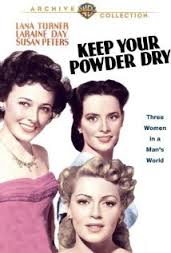
KEEP YOUR POWDER DRY
US, 1945, 93 minutes, Black and white.
Lana Turner, Laraine day, Susan Peters, Agnes Morehead, Natalie Schaefer, Lee Patrick, Bill Johnson, Henry O’ Neil, June Lockhart.
Directed by Edward Buzzell.
Keep Your Powder Dry was released just before the end of World War II. It was another of MGM’s contributions to the war effort, especially focused on women and the role of the WACs.
The plot is familiar enough, a kind of female version of Soldiers Three. Lana Turner has the opportunity to be glamorous, indolent, unaware of the war effort, choosing a career to make a good impression on board members to give her her inherited money. But she also has the opportunity to look very smart in uniform and to show how anyone can absorb the military culture, benefit by it, change character. By way of contrast, Laraine Day is the daughter of a military officer, brought up on military bases, knowing all the rules and regulations, but imposing her commanding personality on everybody else, whether they liked it or not. The third member of the group is Susan Peters, a far more sympathetic character, married to a soldier and, in a surprise and very sad ending, learning of his death in action. There is some humour and repartee offered by Lee Patrick as a showgirl turned WAC, turned Cook. The men are not really important to the whole proceedings.
The film was directed by Edward Buzzell, a director of comedies including the Marx Brothers in Go West and At the Circus.
1. MGM production and its style, cast, its participating in the war effort? The portrait of the WACs, patriotism? A wake-up call to the complacent to help with the war?
2. The film coming at the end of the war, the war in Europe, the war in the Pacific – and Annie’s husband, serving, letters and recordings, love, the telegram and the pathos of his death?
3. Black-and-white photography, fashionable apartments, the WAC stations, dormitories, offices? The details of life on the base? Musical score?
4. The focus on Valerie, wealth, not accessible, her wanting it, her idle lifestyle, sleeping until 2 o’clock, the visit of the solicitor, the issue of the money, the lease in Palm Beach, Harriet’s advice, the suggestion that she joined the WACs and how this would please the administrators?
5. Valerie, Lana Turner style, in herself, going to join up, the encounter with Leigh, with Annie?
6. Leigh, style, military brat, the visit to her father, joining up, her controlling, knowing all the facts and figures in the regulations, the confrontation with Val and the instant dislike, Annie as a mediator, Leigh throwing her weight around, the dislike of the other women?
7. Annie, with her husband, his going to the war, the farewell, her more gentle nature, writing the letters, the recordings, with Leigh and Val, sharing their experiences, lacking self-confidence, succeeding in going to the officers’ course, mediating between the other two? Interview with the commander, the telegram, her grief, immediately being accosted by Leigh, her being asked to mediate, agreeing, listening to the two, walking out on them, the others discovering the telegram and their sympathy for her? Her life and its effect on them?
8. The details of the course, the dormitory, meals, drills, classes, graduating? going to the officers’ course, each changing their option but yet finishing together? Val and the rules, circumventing them, Leigh and her strictness? With the men?
9. Harriet and Junior and the uncle, their flippant life, Junior and his drinking, Val telling him off, his throwing the hat out the window? Leigh asking them to be quiet? Junior meeting her again, telling the story about Val, the money, yet Val deciding to stay in the corp, her asking Leigh to help her, taking her place? Then turning on her?
10. The interviews about graduating? Val and her commanding the platoon, Leigh riding her hard, the harsh report? Val not denying anything, resigning? Leigh and her interview, the commander telling her that half the corp did not think she was officer material? The effect? Taking Annie, going to apologise?
11. The recruitment story, life in the corp, the comic touches, especially with Gladys, her performances, repartee, and the serious detail? With the underlying plot of the rivalry between the two women?